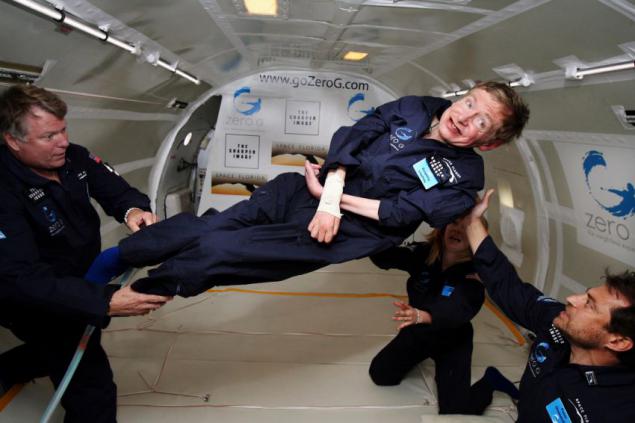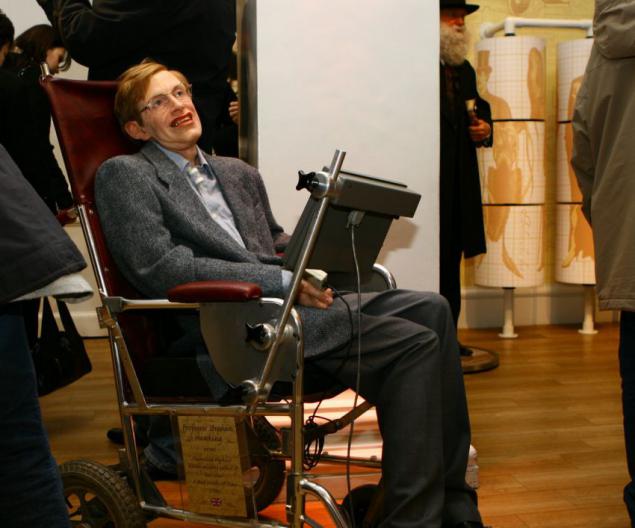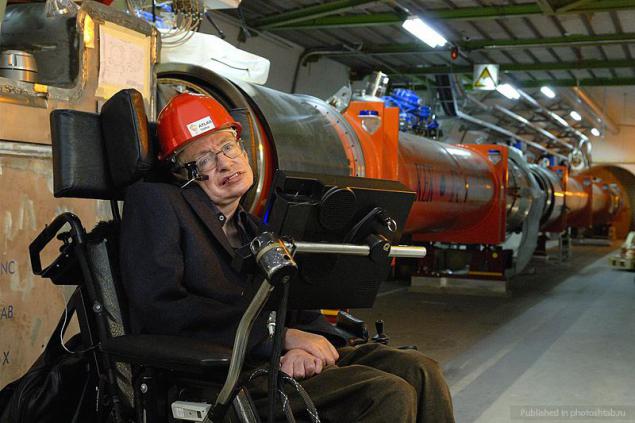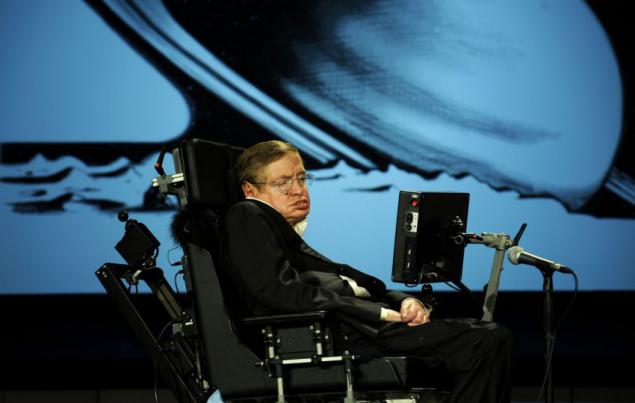1163
Stephen Hawking and his diagnosis
More than 50 years ago, Stephen Hawking was diagnosed with an incurable disease. During this time he gained worldwide fame and became one of the greatest astrophysicists of our time, started the children and even visited in weightlessness ... How is that even possible?

A month ago, confined to a wheelchair, paralyzed Stephen Hawking deep exceeded 72. The scientist continues to lead the Centre for Theoretical Cosmology at Cambridge, come up with ideas, exciting world of science, publish popular books, conduct an active public, and even family life - so that there is a few years ago, he was in weightlessness! .. How he manages to live up to such a ripe old age and to maintain vitality, despite the severe neurodegenerative disease?

Amyotrophic lateral sclerosis (ALS), Hawking was diagnosed in almost half a century ago. Today, the image of the scientist, alas, is inextricably linked with his wheelchair, and since 1985 he is able even to talk only with the mediation of a computer and special software that reads the movement of his eyes and cheeks.

Apparently, Hawking's case is unique not only in terms of scientific career, but also for medicine. ALS - also known as Lou Gehrig's disease or Lou Gehrig's disease - is associated with a slow but continuous degradation of motor neurons of the central nervous system, located both in the spinal cord and in the brain. Causes of the disease remains unknown, but the constant motor neuron death deprives the muscle innervation, and they quickly atrophy - paralysis.

Usually, death occurs as a result of failure of respiratory muscles, and it comes much faster than the Hawking. ALS usually develops close to 50 years, but a scientist it was diagnosed as early as 21 years of age, and hardly anyone expected that it will survive at least until 25. A unique case Hawking commented renowned neuroscientist, professor at the University of Pennsylvania Maklaski Leo (Leo McCluskey). He is convinced that the matter is not in some incredibly high-quality health care around the clock, which receives a scientific celebrity. "This case clearly shows that the ALS is a disease, and surprisingly diverse in its flow, and manifestations - said Maklaski. - Usually, after confirmation of the diagnosis, such patients do not live more than 2-3 years, although many of them longer, and sometimes - like Hawking - a lot longer. "

Life expectancy of ALS patients is determined by the development of degradation of the motor neurons that control the diaphragm muscles and neurons that control swallowing. The death of the first stops breathing, the second - does not allow the body to receive the necessary amount of food and water.

If those and other neurons, for whatever reason, remain active, medical equipment and treatment allow to prolong life even despite the general deterioration of the patient - as is the case with Hawking. Unfortunately, such a development of ALS is very unusual, and so slow the disease occurs in only a few percent of patients.

In the early 2000s, it was established that, like many other neurodegenerative diseases, ALS is associated with an abnormal accumulation in the brain neurotransmitter molecules. According to some, is an inherited disorder may be caused by an excess of glutamic acid, which causes some neurons to work at full capacity and quickly disintegrate. Now the search is on for genes violation of which may lead to the development of ALS, but the work is far from over - and even more so from the creation of some specific treatment approaches.

Source: naked-science.ru

A month ago, confined to a wheelchair, paralyzed Stephen Hawking deep exceeded 72. The scientist continues to lead the Centre for Theoretical Cosmology at Cambridge, come up with ideas, exciting world of science, publish popular books, conduct an active public, and even family life - so that there is a few years ago, he was in weightlessness! .. How he manages to live up to such a ripe old age and to maintain vitality, despite the severe neurodegenerative disease?

Amyotrophic lateral sclerosis (ALS), Hawking was diagnosed in almost half a century ago. Today, the image of the scientist, alas, is inextricably linked with his wheelchair, and since 1985 he is able even to talk only with the mediation of a computer and special software that reads the movement of his eyes and cheeks.

Apparently, Hawking's case is unique not only in terms of scientific career, but also for medicine. ALS - also known as Lou Gehrig's disease or Lou Gehrig's disease - is associated with a slow but continuous degradation of motor neurons of the central nervous system, located both in the spinal cord and in the brain. Causes of the disease remains unknown, but the constant motor neuron death deprives the muscle innervation, and they quickly atrophy - paralysis.

Usually, death occurs as a result of failure of respiratory muscles, and it comes much faster than the Hawking. ALS usually develops close to 50 years, but a scientist it was diagnosed as early as 21 years of age, and hardly anyone expected that it will survive at least until 25. A unique case Hawking commented renowned neuroscientist, professor at the University of Pennsylvania Maklaski Leo (Leo McCluskey). He is convinced that the matter is not in some incredibly high-quality health care around the clock, which receives a scientific celebrity. "This case clearly shows that the ALS is a disease, and surprisingly diverse in its flow, and manifestations - said Maklaski. - Usually, after confirmation of the diagnosis, such patients do not live more than 2-3 years, although many of them longer, and sometimes - like Hawking - a lot longer. "

Life expectancy of ALS patients is determined by the development of degradation of the motor neurons that control the diaphragm muscles and neurons that control swallowing. The death of the first stops breathing, the second - does not allow the body to receive the necessary amount of food and water.

If those and other neurons, for whatever reason, remain active, medical equipment and treatment allow to prolong life even despite the general deterioration of the patient - as is the case with Hawking. Unfortunately, such a development of ALS is very unusual, and so slow the disease occurs in only a few percent of patients.

In the early 2000s, it was established that, like many other neurodegenerative diseases, ALS is associated with an abnormal accumulation in the brain neurotransmitter molecules. According to some, is an inherited disorder may be caused by an excess of glutamic acid, which causes some neurons to work at full capacity and quickly disintegrate. Now the search is on for genes violation of which may lead to the development of ALS, but the work is far from over - and even more so from the creation of some specific treatment approaches.

Source: naked-science.ru























